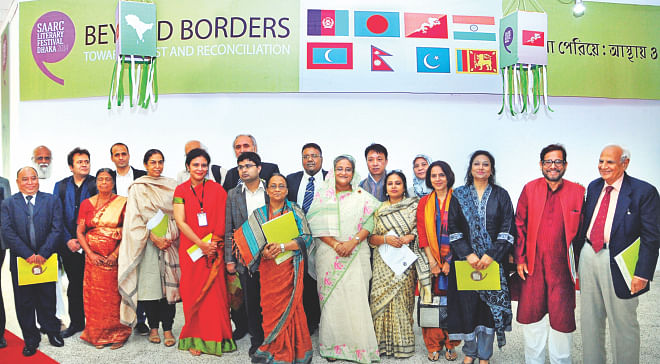Litterateurs, connoisseurs gather to melt borders

Aiming to melt borders through intellectual interactions, writers, poets and academicians of the eight South Asian Association for Regional Cooperation (Saarc) countries met at SAARC Literary Festival Dhaka 2014 yesterday.
Inaugurated by Prime Minister Sheikh Hasina in the capital's Bangladesh National Museum, the two-day festival on paper presentations, discussions and poetry recitations seeks to build on its theme, “Trust and Reconciliation Beyond Borders”.
Litterateurs and literature connoisseurs numbering 29 are participating in the festival organised by Writers Readers Illustrators Translators and Educators (WRITE) Foundation, the Bangladesh chapter of the Foundation of SAARC Writers and Literature (Foswal).
About 50 Bangladeshi writers, poets, researchers, academicians and publishers joined the foreign delegates in yesterday's five sessions and are expected to attend five more today.
Yesterday's sessions focused on how literature at many times revealed historical truths and bridged gaps created through traumatic events such as the partition of the Indian subcontinent in 1947.
Presenting his academic paper, “Bridging trans-border historical trauma: problems and prospects of reconciliation” in the first session, Nepali essayist, critic, playwright and poet Abhi Subedi discussed the historical trauma created by the rise of borders in South Asia.
In Maldivian cultural personality and former policymaker Ibrahim Waheed's speech, the anguish of the current divide borders impose on free movement within South Asia came up.
Sri Lankan educationist Kamala Wijeratne in her presentation proposed launching an e-journal for publishing and sharing Saarc literature.
She also called to create a youth forum within Saarc and start giving away a literary award to young writers so that they can share experiences and rebuild trust.
Indian novelist Ravishankar Bal and academician Sukrita Paul Kumar also spoke at the session chaired by Bangladeshi writer Syed Manzoorul Islam.
The second session, “Partition Literature”, had interesting deliberations by Bangladeshi writer Selina Hossain, Liberation War Museum Trustee and researcher Mofidul Hoque and Indian academician Refaqat Ali Khan.
Mofidul explained why there was a dearth of literature on the partition in the then East Pakistan, currently known as Bangladesh.
“It was difficult to write about the partition when you have arrived in a land of Muslims and you cannot lament for the land you have left behind, the land of the Hindus,” he said on the situation of Muslims migrating from India to Pakistan after the partition.
Mofidul also pointed out how war trauma passed on to future generations who were later found to have carried out the same kind of violence their ancestors were once subjected to.
To this end, he cited examples of the Punjabi men, comprising the majority in the then Pakistan occupation forces, who tortured Bangalees during the 1971 Liberation War and whose ancestors had to shift from India during the partition.
He also cited the torture on Palestinians by Israelis whose Jewish ancestors had been victims of the Holocaust during World War II.
The session ended with several beautiful poetry renditions on the partition by Indian poet Hoshang Merchant.
Four more academic papers on violence within and across borders and how it came up in literary discourses in Nepal and Sri Lanka were discussed in another session chaired by Bangla Academy Director General Prof Shamsuzzaman Khan.
Sri Lankan academician MA Nuhman and Nepali poets Bal Bahadur Thapa and Prakash Subedi and cultural activist Shiva Rijal presented their papers.
The day's attraction was the discussion between two legendary Bangla litterateurs, poet Shamsul Huq of Bangladesh and Samaresh Majumdar of India, on “Historical fault lines and reconciliation”.
In the discussion, moderated by Syed Badrul Ahsan, executive editor of The Daily Star, Shamsul Huq presented his personal recollection on the partition.
“Borders cannot divide language or the emotions of human being,” said Majumdar, adding that he was proud to write in Bangla, the language for which people laid down their lives. The day ended with poetry recitations in different languages.
Chair of one of the sessions, Prof Niaz Zaman, told The Daily Star, “Conferences of this sort are platforms where we can express our common humanity and overcome our differences.”
Rubana Huq, secretary general of WRITE Foundation, said they plan to hold a bimonthly lecture series on literary subjects and start working on translations of Bangladeshi writings which lack exposure.
“Instead of calling it a conference we preferred festival to celebrate the togetherness,” she said, adding that the festival, being held for the second time, was first held in 2001 by Foswal.

 For all latest news, follow The Daily Star's Google News channel.
For all latest news, follow The Daily Star's Google News channel. 



Comments